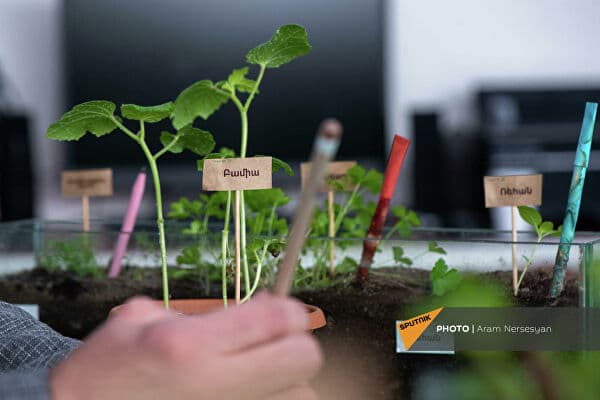Fountain pens have appeared on the Armenian market that can grow into a particular plant, if they are planted in the ground, like ordinary seedlings – Karine Harutyunyan Sputnik, from Yerevan. These pens, by the way, are made from recycled paper waste.
Armenian eco-pens can be used for their intended purpose – as a stationery, and when the ink runs out, such pens can be “planted” and get, for example, carrots, beets, basil, okra, quinoa, mustard, radish, spinach, and many other types of vegetables and ornamental plants. Yes, yes, there is no typo – such a wide range of agricultural products can be obtained by just planting a pen in the ground.
“We have been producing eco-friendly pens from recycled paper waste for 7 years, and recently we decided to create something new, interesting, which will bring people even closer to nature. We decided to start producing“ growing pens ”so that even after use, they can serve nature . We began to experiment and select seeds, “said Artak Elbakyan, Founding Director of Eco pen.
After the plant varieties that were best adapted to the local climatic conditions were selected, their seeds were placed in soluble transparent capsules, fixed on handles and planted in the ground. Already a few days later, when the first shoots sprouted and the experiment was recognized as successful, the production of “growing pens” began.
In order to grow any plant or vegetable, you just need to stick the used eco-pen into the ground at an angle of 30 degrees. The capsule built into the handle dissolves in the soil and releases the seeds in it. Further, it is only required to water the resulting seedlings from time to time.
Elbakyan says that the most difficult thing was to determine the market price, since there was nothing to compare with: there was no such product on the market yet.
Eco pen produces 30 pens per day, with most of the work done by hand. According to the director of Eco pen, “growing pens” are quite popular among buyers, especially as a gift for children.
For example, radishes and beets germinate in just a few days, and it all looks very beautiful.
“We teach people to take care of nature and children, by“ planting ”our pens, learn to give life and take care of their“ pets. ”If you took something from nature, for example, in order to make paper, then by planting a plant, you give something back to her, “says Elbakyan.
His sister and companion Ani Elbakyan, in turn, noted that children are very happy when they see how an ordinary ballpoint pen turns into a living plant.
“Children learn not to harm nature. There was also an entertaining case when a child who does not use greens, he himself raised cilantro from a hand planted with his own hand, and then added it to his salad and ate it,” said Ani.
In the near future, the company also intends to import seeds of exotic plants, if, of course, as a result of experiments, it is possible to achieve their cultivation in ordinary home conditions, without much care.
In addition, a museum will be opened, where eco-pens will be presented, and not only as museum exhibits – everyone, and especially children, will be given the opportunity to plant plants with their own hands. The company hopes that this may also interest tourists.









